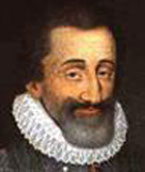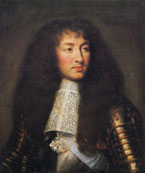- The Daniel & Marie Warenbauer Ferree family were French Huguenots.
- From the 16th to the 18th century, the name Huguenot was applied to members of the Protestant Reformed Church of France known as the French Calvinists.
- The Reformed Church was established in 1550 by John Calvin.
- The French Protestants referred to themselves as "reformees" rather than Huguenots. "Huguenot" was a disrespectful term; it later became an honor of which their descendants are proud.
- Under Francis I and Henry II, the Huguenots suffered severe persecution for their faith, however, they survived an attempt to exterminate them during the Massacre of St. Bartholomew in 1572, and the next thirty years of religious wars.
- In 1598, the Edict of Nantes granted them religious rights, but the edict was revoked in 1685, forcing thousands of Huguenots to flee.
|
 The Edict of Nantes was issued on April 13, 1598, by Henry IV of France. At the time of the Edict, Henry was a Catholic king. He had been a Huguenot before ascending to the throne in 1589, but in order to become king he agreed to conform to the Roman Catholic church. The edict granted unheard of religious rights to the Huguenots by giving them equal civil rights with those of Catholics; accepted their marriage; gave them, under restrictions, permission to meet for worship and for consultations, and granted them cities for the secruity of their rights. The Edict of Nantes was issued on April 13, 1598, by Henry IV of France. At the time of the Edict, Henry was a Catholic king. He had been a Huguenot before ascending to the throne in 1589, but in order to become king he agreed to conform to the Roman Catholic church. The edict granted unheard of religious rights to the Huguenots by giving them equal civil rights with those of Catholics; accepted their marriage; gave them, under restrictions, permission to meet for worship and for consultations, and granted them cities for the secruity of their rights.
 The Revocation of the Edict of Nantes was issued on October 22, 1685, by the French king, Louis XIV. He ranks as one of the most remarkable monarchs in history. He was capable of maintaining a strong kingdom because he never doubted his right to be king. He lived and ruled as a king should have and was determined that Catholicism was to be the only accepted religion for the French people. The Revocation of the Edict of Nantes forbid Huguenots to practice their religion and ordered destruction of their churches and closing of their schools. The Revocation of the Edict of Nantes was issued on October 22, 1685, by the French king, Louis XIV. He ranks as one of the most remarkable monarchs in history. He was capable of maintaining a strong kingdom because he never doubted his right to be king. He lived and ruled as a king should have and was determined that Catholicism was to be the only accepted religion for the French people. The Revocation of the Edict of Nantes forbid Huguenots to practice their religion and ordered destruction of their churches and closing of their schools.
|
